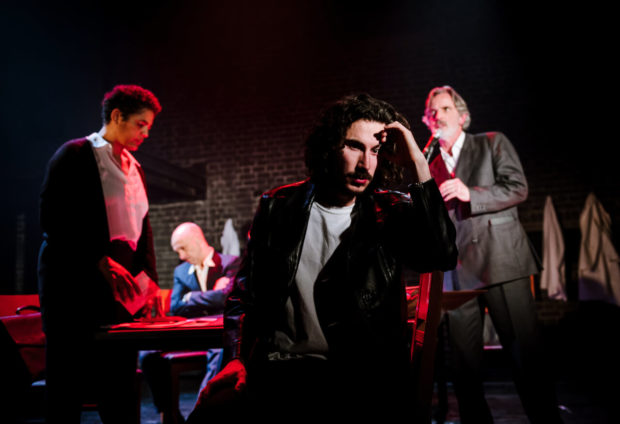You have no items in your cart. Want to get some nice things?
Go shopping
Albert Camus’s most famous work ends with a warning: “The plague bacillus never dies […] perhaps the day will come when, for the instruction or misfortune of mankind, the plague will rouse its rats and send them to die in some well-contented city.” The novel, published in 1947, is often read as an allegory for the Nazi occupation of France, lending these lines prophetic significance. With fascism and Nazism becoming buzzwords once again in relation to populist leaders like Donald Trump and Marine Le Pen, the time is ripe for a retelling of Camus’ tale of human decency in the face of a seemingly unstoppable evil. To use a phrase which recurs throughout Neil Bartlett’s taut adaptation of the novel, it is time we “call things by their proper name” to avoid sleepwalking into the mistakes of the past.
Camus’ novel is a sweeping anthropological study, probing with easy insight into how the citizens of Oran, Algeria survive alongside a deadly epidemic in a town under lockdown. With so much of the text focusing on the shared mindset of the community, a stage adaptation – especially a performance with only five actors – is not an easy undertaking. Neil Bartlett’s take on the novel is bold and effective, yet sacrifices some important scenes in the name of economy.
The retrospective take on the epidemic is key to Camus’s novel, and Bartlett has found an ingenious way of retaining it by staging his adaptation as a public inquiry. Documents and files litter the stage and there’s a liberal smattering of dates and figures in the dialogue. You can’t help but feel it’s all somewhat pedantic, like one of those sprawling reports into modern controversies that arrive years after the event and achieve nothing. An inquiry will in some senses always be too little too late; the only power it has is to prevent history from repeating itself, attribute blame and (as Dr Rieux famously explains) “to make sure that there is at least some memory of the injustices and violences that have been done to people.” This is, perhaps, one of the key ironies of this revival of Camus’s novel 50 years after its publication. The Holocaust was far from the last genocide of the twentieth century, and even today we read the news of prison camps for gay men in Chechnya. This production has an awareness of the limitations of art; our responsibility to document evil but also our inability to learn from it.
As an allegory the production was undoubtedly a success. Camus’ denunciation of economic inequality was subtly underlined, as was Dr Rieux’s (Sara Powell) frustration at the bureaucracy she must fight to protect the citizens of Oran from the plague. Cottard (Joe Alessi), who cuts a more pathetic figure in the novel, here becomes a chillingly amoral villain, leaving us uncomfortably ambivalent when he faces his comeuppance in a brutal police beating.
There was, unfortunately, a great deal left out of the novel that detracted from the overall effect. At a running time of only 90 minutes Bartlett could easily have expanded on more of Camus’ themes, and what he gained in pacing he lost in complexity. Father Paneloux, the priest whose hellfire and brimstone sermons are tempered by his personal contact with plague victims, is noticeably absent in this stage adaptation. In the novel, Tarrou gives us one of the most effective formulations of the problem of evil after Paneloux unconvincingly clings to his faith following the death of a child from the disease. “When innocence has its eyes gouged out,” Tarrou explains, “a Christian must lose his faith or accept the gouging out of eyes.” Perhaps this exchange is less relevant in an age of ever-decreasing church attendance, but for me, it loses none of its power.
The main flaw in Bartlett’s production is the characterisation. The action is relentless and rarely gives us pause to reflect on the character’s inner lives. For Camus, the plague was a philosophical testing ground which laid bare the absurdity of life, and you never truly get this sense in Bartlett’s production. Joseph Grand (Burt Caesar) is no longer a frustrated novelist obsessively rewriting the first sentence of his magnum opus – one of the most striking images of futility in the novel. The citizens of Oran no longer pack into the cinemas to see the same film on endless repeat or attend weekly performances of Gluck’s Orfeo ed Euridice. Tarrou’s (Martin Turner) edgy and difficult morality is simplified into a general benevolence; his backstory is cut; and his relationship with Rieux loses much of its power. The ending of Camus’s novel brought me close to tears when, amid celebrations over the defeat of the plague, Rieux realises “that there would no longer be any peace possible for himself.” Bartlett’s handling of this aspect of the novel, on the other hand, left me resolutely dry-eyed.
Nevertheless, there is undoubtedly more to praise than critique. As with much of Bartlett’s work, the play’s minimalism works a treat. The veteran director wisely chose not to attempt any gory representation of the plague’s symptoms onstage, instead relying on Camus’s vivid prose and Dinah Mullen’s excellent sound design to leave much to the imagination yet make certain scenes almost unwatchable. Though there were no showy performances – Camus insists his novel is about human decency rather than individual heroism – Powell was perfect as Rieux, an all-too-human protagonist who tirelessly fights a losing battle against the spread of the disease.
This is certainly a slick and highly relevant revival that neatly sidesteps many of the problems of literary adaptations. For those new to Camus’s classic novel it easily gets to the heart of the key thematic concerns while also proving a gripping watch. Those who have read the book may share my disappointment at some of Bartlett’s omissions, but, after all, protesting that “it’s not as good as the book” is something of a cliché.
The Plague continues at the Arcola Theatre until May 6 2017. Tickets are £12-£22 (or £10 with an Arcola Passport).

About Simon Fearn
Simon is a student at Durham University and aspiring theatre critic. He has reviewed at the Edinburgh Fringe with EdFringeReview and is Stage Editor for Durham's student newspaper, Palatinate. He has also written music reviews for W!zard Radio and Cuckoo Review.




